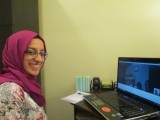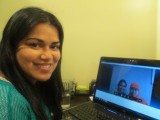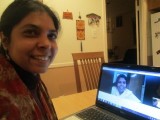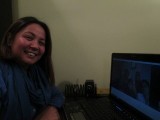what’s in a Skype conversation?
What’s in a Skype conversation?
By Yousra Yusuf
In a span of seven weeks in November and December 2013, volunteers— friends of Adhunika from Adhunika Foundation (Adhunika USA)—met with students at Adhunika Women’s Center (AWC), Dhaka for the pilot project of Skype session workshops. As per popular request, the purpose of these sessions was to help students practice their English speaking skills during the workshops. Students met with the volunteer facilitators at a specified time and discussed about various topics during the session.
A primary focus of the workshops according to Shahnaz S. Yousuf, founder of Adhunika Foundation whose office setting was mainly used by the facilitators here to conduct the sessions, was to “allow volunteers from the US to have more regular contact with students in AWC.” Much of the work done with the funds raised by Adhunika USA volunteers reaps results miles away; these sessions were proposed as a method to bridge the existing gap between volunteers here and participants in Bangladesh. In addition, the sessions were a means to bring light to the women who were benefited by the work done here.
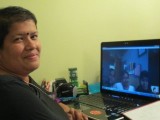
The sessions were directed by a diverse group of friends of Adhunika. Four volunteers, namely Emma Rahman, Kyoko Mona, Ishita Uddin and Yousra Yusuf together with Shahnaz Yousuf facilitated the approximately two-hour discussions. Classes were conducted in an informal, discussion format and topics ranged from personal issues of daily life in Bangladesh to national issues of macroeconomic growth, sexual harassment and educational system in Bangladesh.conduct the sessions, was to “allow volunteers from the US to have more regular contact with students in AWC.” Much of the work done with the funds raised by Adhunika USA volunteers reaps results miles away; these sessions were proposed as a method to bridge the existing gap between volunteers here and participants in Bangladesh. In addition, the sessions were a means to bring light to the women who were benefited by the work done here.
An emotion that resonated during the preliminary feedback to the sessions was that of positivity. All the volunteers appreciated the opportunity to meet Adhunika students at a personal level. Shahnaz Yousuf found the students’ “eagerness to talk to us for an hour and a half every week refreshing.” Ishita Uddin who is a high school English teacher in New York City, described her discussion with the students on the education system in Bangladesh as her “most meaningful experience” in her two years with Adhunika.
Emma Rahman, who works with the FDIC and has been with Adhunika for over ten years, got the chance to talk extensively with the in-country manager of the Center, Nazma Khatun, and was surprised at how fluent the manager was in her English and hoped the students would also be able to develop their skills with constant practice.
Dr. Kyoko Mona—Assistant Professor at Manhattanville College and an Adhunika Board Member who joined the organization in 2004—although considerably impressed by how the students answered her questions and summarized her lecture on macroeconomic growth felt that the students “did not challenge her with their ideas and thoughts.”
For me, the session was the highlight of my two years with Adhunika. Hearing personal stories about the topic of sexual harassment from the girls in their halted but proudly-spoken English made me reaffirm my intention of supporting Adhunika’s cause towards women’s issues. Through this session, I gained more perspective on the humans, the women and girls, we are working with through our efforts here in the US. So now, every time a person brings up Adhunika Women’s Center in the conversation, I don’t think of a brick building with computer rooms, I picture five girls and their expressive faces and realize how everything we do miles away from them in this country could be impacting these girls and others like them in some way or another.
After the completion of any project, one comes up with a list of things that can be improved. Our sessions were no exception. For future sessions, we are hoping to change the structure of the classes. After the Skype conversations, we will add an off-camera assignment section for the students. We also hope to add a discussion session with the manager, Nazma, to allow her to hone her English skills. Furthermore, we will ask some selected students from previous cohorts to mentor students in the current cohort to help them further develop their knowledge and experience.
Despite the rosy reactions from the students and the teachers, the sessions came with its set of problems. The biggest challenge during our session was the lack of proper equipment. Five students and the manager had to huddle in front of one computer to be able to talk to us and listen to the lectures. There were countless times when we—students and facilitators, alike—wished for a bigger screen or a projector. A bigger screen or classroom could also help us reach a larger number of students through these sessions. However, plans to acquire the necessary equipment, increase the class size etc, are always dependent on our generous donors.
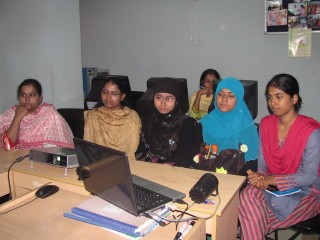
First Live On-line Class with the Adhuanika Women’s Center’s. The class was lead by Shahnaz S. Yousuf – the Founder & President of Adhunika Foundation. Class was supervised by Nazma Khatun, Manager of Adhunika Women’s Center. & was attended by five students.
While doing projects like these, we are constantly reminded of the age-old phrase, “no amount of help is too small”. We rely on both monetary help and volunteer efforts to make any program a success at the Center. These Skype sessions and other projects undertaken by Adhunika can make vast improvements only through sincere efforts taken by each of you– our friends of Adhunika. And improving the programs could possibly mean a change in not just one woman’s conditions but a change in the circumstances for larger numbers of women who we are honored to serve through Adhunika Women’s Center.
And lastly, to truly answer the question, “What’s in a Skype conversation?” all I have to say to you is, join me for a session and experience it for yourself!

